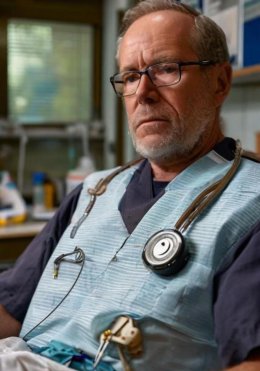Nine Days in June. The Restart.

Nine Days in June. The Restart.
Chronology of events.
June 1, 2025. Got up early in the morning. Felt slight dizziness. Twice lost consciousness for a few moments and fainted. The first time I thought it was just morning weakness, but the second fainting worried me, especially since I hit my head a little. I remembered that the other day I fell the same way, but hit myself harder and injured the back of my head. Such fainting had been bothering me for over a year, and I did not pay much attention to it, but this time I decided to call an ambulance.
The ambulance arrived quickly. Two medics examined me, considered my condition dangerous and suggested going to hospital. I agreed, since I had never fully regained consciousness. I did not even have the strength to call my loved ones on the phone and tell them that they were taking me to hospital.
Upon arrival at Buyanov Hospital, the medical staff there immediately started preparing me for surgery. I had a poor understanding of what they were going to do with me. They took away my phone and did not let me drink, eat, or get up from the hospital gurney.
After some time, I they took to an operating room. At some point, I realized that they were going to implant a pacemaker in me. I still do not know exactly what the correct medical diagnosis for my condition before the operation was. Later I understood that my heart was practically stopping and that it needed to be stimulated.
The operation was without general anesthesia and seemed to last forever. I was operated on under local anesthesia. I heard every rustle in the operating room and felt every movement of the surgeon's hand. Moreover, I heard all the conversations between the surgeon and the operating-room nurse. They were in alone in the room and chatted cheerfully during the operation.
From their conversations, I understood that this was the first independent operation of the young surgeon, who outwardly reminded me of a migrant worker from a southern former Soviet Union republic. He was very proud of his first unsupervised surgery and turned to the nurse for admiration and she approvingly played along. I was losing my patience and asked the surgeon a few times: “How much longer? Will the operation be over soon?” In response, he answered knowingly: “I do not know.” Either he really did not know, or he was really so carried away by the surgery that he did not even want to finish it. I was close to nervous breakdown when I began to smell burnt flesh. Here the surgeon turned to me for the first time with the remark: “Your vessels are very tortuous.” I did not get what he meant, but later I understood. It turns out that, in order to pass electrodes from the pacemaker to the heart through the blood vessels, the electrodes are heated up and then pushed to the heart, burning the vessels from the inside. So I realized that this burning smell was coming from my vessels. I almost begged: "I can't stand it anymore." The surgeon was genuinely surprised and asked: "Is it true that you fainted twice today?" – "Yes." – "And have you had a number of such fainting spells this week?" – "Yes." – "And after this, you do not want to endure the operation?" – "I can't stand it anymore." He was surprised, as if saying: "well, well" and continued the surgery in science.
Finally, the execution was over. Judging by the timekeeping, it lasted more than 4 hours, from 12:17 p.m. to 16:25 p.m. The surgeon, pleased with himself, asked me: "Well, how did you like the surgery?" I answered: "It was terrible." He did not understand the farce, since he was preoccupied with himself during the entire operation. Or maybe he considered me a freeloader who did not appreciate free treatment at the expense of the compulsory medical insurance. According to my electronic medical record, the pacemaker implantation cost the state 351,328 rubles 78 kopecks (circ. USD 4,300).
